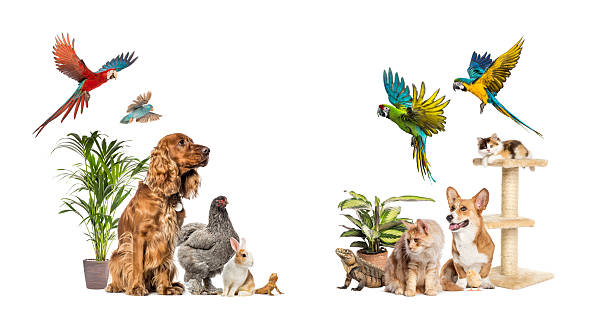
Exotic Pet Breeds You Can Keep Legally at Home: Unique Companions Without Legal Hassles
Discover a comprehensive guide to exotic pet breeds that you can legally keep at home, exploring their care, appeal, and what makes them fascinating companions for adventurous pet lovers.
🐶 Pet Star
27 min read · 25, Jul 2025

Introduction to Legal Exotic Pets
Exotic pets have surged in popularity as more people seek unique companions beyond traditional cats and dogs. However, owning an exotic animal comes with significant legal and ethical considerations. Laws regulating exotic pet ownership vary widely by country, state, and even municipality, often aimed at protecting native ecosystems and ensuring animal welfare. This article provides an insightful exploration of exotic pet breeds that are legal to keep at home, focusing on their care requirements, characteristics, and the benefits of owning them responsibly.
Understanding Exotic Pet Laws: What You Need to Know
The Importance of Legal Compliance
Before bringing any exotic pet home, understanding local, state, and federal regulations is crucial. Illegal ownership can result in hefty fines, confiscation of the animal, and even criminal charges. For example, in the United States, the Lacey Act and the Endangered Species Act govern the trade and possession of certain wildlife. Additionally, many states have their own lists of prohibited species.
Common Legal Restrictions
- Prohibited Species: Many venomous snakes, primates, large carnivores, and non-native wildlife are banned outright in numerous jurisdictions.
- Permit Requirements: Some exotic pets require special permits, such as large reptiles or birds of prey.
- Import/Export Laws: International treaties like CITES regulate the trade of endangered species, affecting exotic pet availability.
Expert Insight
Dr. Hannah Owens, a wildlife law specialist, states, “Legal compliance protects both the owner and the animal. Always check the most current regulations and seek professional guidance.”
Top Exotic Pet Breeds You Can Legally Keep at Home
1. Bearded Dragons (Pogona vitticeps)
Bearded Dragons are one of the most popular and legal exotic reptiles worldwide. Native to Australia, they are known for their docile temperament and ease of care.
- Care Essentials: Require UVB lighting, a balanced diet of insects and greens, and a terrarium with basking spots.
- Behavior: Social and interactive, often responding to their owners.
- Lifespan: Typically 8-12 years.
Their manageable size and calm nature make them ideal for first-time exotic pet owners.
2. Leopard Geckos (Eublepharis macularius)
Leopard Geckos are nocturnal lizards originating from the arid regions of Afghanistan and Pakistan.
- Care Essentials: Thrive in dry environments, eat live insects, and need a secure enclosure.
- Temperament: Gentle and low-maintenance.
- Lifespan: Can live 10-20 years with proper care.
Due to their hardiness and low maintenance, they are excellent legal exotic pets.
3. Sugar Gliders (Petaurus breviceps)
Sugar Gliders are small marsupials native to Australia and Indonesia, beloved for their gliding ability and social nature.
- Care Essentials: Require large cages, a specialized diet including fruits and protein, and social interaction.
- Legal Status: Legal in many states with permits; some states restrict ownership.
- Lifespan: 10-15 years in captivity.
Their need for companionship makes them ideal for dedicated owners.
4. African Pygmy Hedgehogs (Atelerix albiventris)
These small, spiny mammals are native to central Africa and are prized for their charming personality.
- Care Essentials: Require warm environments, balanced diets, and nightly exercise.
- Legal Status: Legal in many states, though some restrict them due to concerns about rabies.
- Lifespan: 3-6 years.
Their nocturnal activity and curious nature make them engaging pets.
5. Ball Pythons (Python regius)
Ball Pythons are popular non-venomous snakes from sub-Saharan Africa known for their calm demeanor.
- Care Essentials: Require secure enclosures, controlled humidity, and a diet of rodents.
- Temperament: Docile and rarely aggressive.
- Lifespan: 20-30 years.
They are legal in most areas and favored by reptile enthusiasts.
6. Axolotls (Ambystoma mexicanum)
Axolotls are unique aquatic salamanders native to Mexico, famous for their regenerative abilities.
- Care Essentials: Require cool, clean water and specialized diet including worms and pellets.
- Legal Status: Legal in many states, with restrictions in some due to invasive species concerns.
- Lifespan: 10-15 years.
Their fascinating biology and manageable size make them captivating pets.
7. Fennec Foxes (Vulpes zerda)
Fennec Foxes are small desert foxes native to North Africa with large ears and playful personalities.
- Care Essentials: Require ample space, mental stimulation, and a specialized diet.
- Legal Status: Legal in some states with permits; illegal in others.
- Lifespan: 10-12 years.
They require experienced owners and legal compliance due to their unique needs.
8. Madagascar Hissing Cockroaches (Gromphadorhina portentosa)
These large cockroaches are non-invasive and popular among insect enthusiasts.
- Care Essentials: Easy to care for with minimal space and a diet of fruits and vegetables.
- Legal Status: Generally legal with no restrictions.
- Lifespan: 2-5 years.
They are fascinating for educational purposes and easy for beginners.
9. Dwarf Caimans (Paleosuchus palpebrosus)
Dwarf Caimans are the smallest of the alligator family, native to South America.
- Care Essentials: Require large aquatic enclosures with basking areas.
- Legal Status: Legal with permits in some states; banned in others.
- Lifespan: 20-30 years.
They need experienced owners due to their size and care complexity.
10. Pacman Frogs (Ceratophrys ornata)
Pacman Frogs are colorful amphibians known for their large mouths and voracious appetite.
- Care Essentials: Require humid environments and a diet of insects and small rodents.
- Legal Status: Widely legal.
- Lifespan: 6-10 years.
They are popular for their ease of care and striking appearance.
Ethical Considerations and Responsibilities in Exotic Pet Ownership
Ensuring Animal Welfare
Owning an exotic pet carries a responsibility to provide a suitable environment that meets the animal’s physical and psychological needs. Poor care can lead to stress, illness, and premature death.
Avoiding Illegal Wildlife Trade
Purchasing pets only from reputable breeders or rescues prevents contributing to illegal trafficking, which threatens wild populations.
Educating Yourself
Learning about species-specific needs and maintaining ongoing education is key to responsible ownership. Joining exotic pet organizations or forums provides valuable support.
Tips for Setting Up a Safe and Comfortable Habitat
Enclosure Size and Environment
- Match enclosure size to adult size of the pet.
- Include hiding spots, climbing structures, and naturalistic elements.
Temperature and Lighting
- Provide species-specific temperature gradients.
- Use UVB lighting for reptiles and amphibians needing it.
Nutrition and Feeding
- Offer balanced diets reflecting natural feeding habits.
- Avoid overfeeding and monitor for dietary deficiencies.
Sanitation and Health
- Maintain cleanliness to prevent infections.
- Schedule regular veterinary checkups with an exotic animal vet.
The Growing Popularity of Exotic Pets: Trends and Statistics
According to the American Pet Products Association (APPA), exotic pets represent approximately 3-4% of U.S. households with pets, with reptiles and small mammals seeing notable growth in recent years. This trend is driven by increased urbanization and interest in low-allergy, unique companions.
Common Challenges Faced by Exotic Pet Owners
Veterinary Care Access
Finding vets specializing in exotic animals can be difficult, requiring travel or telemedicine consultations.
Legal Changes
Owners must stay updated on changing regulations that might affect ownership or require permits.
Social Needs
Some exotic pets require social interaction with their kind or humans to prevent loneliness.
Expert Advice for First-Time Exotic Pet Owners
- Start with low-maintenance species like Leopard Geckos or Bearded Dragons.
- Research thoroughly before purchase.
- Prepare habitat in advance to avoid stress.
- Establish a routine for feeding and cleaning.
- Connect with experienced owners for guidance.
Conclusion
Owning an exotic pet can be an incredibly rewarding experience, offering a unique bond that transcends the ordinary. This article has explored a wide variety of exotic pet breeds that are not only fascinating and beautiful but also legal to keep at home in many places—provided you follow regulations and ethical guidelines. From the calm and approachable bearded dragons to the enigmatic axolotls and the playful sugar gliders, these pets enrich our lives with their diverse behaviors and appearances.
However, exotic pet ownership is not without its challenges and responsibilities. Ensuring legal compliance, providing specialized care, creating enriching habitats, and understanding the needs of these unique animals are critical to their wellbeing. Neglecting these factors can lead to health issues for the pet and legal problems for the owner. Therefore, extensive research, dedication, and consultation with experts and veterinarians are necessary prerequisites before deciding to bring an exotic animal into your home.
Moreover, ethical considerations such as avoiding animals sourced from illegal wildlife trade, never releasing pets into the wild, and respecting their natural behaviors play a vital role in responsible ownership. Exotic pets are living creatures that require commitment, time, and resources to thrive.
As interest in exotic pets continues to grow, so does the importance of awareness and education among current and prospective owners. By choosing legal, well-cared-for exotic pets, you contribute to a healthier relationship between humans and these remarkable animals while ensuring their preservation in both wild and captive environments.
In conclusion, with careful planning, legal adherence, and compassionate care, keeping an exotic pet can be a safe, legal, and immensely fulfilling experience that brings joy and wonder into your life for many years to come.
Q&A
Q1: What defines an exotic pet legally?
A: An exotic pet is typically any non-domesticated animal that is not traditionally kept as a pet, with its legality depending on local, state, and federal regulations.
Q2: Are all exotic pets legal to own everywhere?
A: No, laws vary widely; some species are banned or require permits depending on location, so it’s crucial to research local regulations.
Q3: How can I ensure the exotic pet I want is legal to keep?
A: Check with your state wildlife agency or local animal control office and consult reputable breeders or exotic pet veterinarians.
Q4: What are some low-maintenance exotic pets for beginners?
A: Bearded dragons, leopard geckos, and Madagascar hissing cockroaches are generally easier to care for and suitable for beginners.
Q5: Why is UVB lighting important for many reptiles?
A: UVB lighting enables reptiles to synthesize vitamin D3, crucial for calcium metabolism and preventing metabolic bone disease.
Q6: Can exotic pets carry diseases transmissible to humans?
A: Yes, some exotic pets can carry zoonotic diseases, so proper hygiene and veterinary care are essential.
Q7: What are common signs of stress in exotic pets?
A: Signs include changes in appetite, hiding, aggression, lethargy, and repetitive behaviors.
Q8: How often should I clean my exotic pet’s habitat?
A: Cleaning frequency varies by species but generally includes daily spot cleaning and a thorough clean weekly or monthly.
Q9: Are permits required for owning sugar gliders?
A: It depends on your location; some states require permits, while others ban sugar gliders entirely.
Q10: What should I do if I can no longer care for my exotic pet?
A: Contact local exotic pet rescues, sanctuaries, or animal welfare organizations to find a responsible new home.
Similar Articles
Find more relatable content in similar Articles

How Climate Change Affects Wild and Domestic Animals...
Climate change is dramatically.. Read More

Sustainable Pet Products: What to Look for in 2025...
As sustainability becomes a ce.. Read More

Vegan Pet Toys and Accessories That Last Longer...
As pet owners grow more eco-co.. Read More

How Pets Strengthen Family Bonds...
Pets are more than just compan.. Read More
Explore Other Categories
© 2024 Copyrights by rPets. All Rights Reserved.